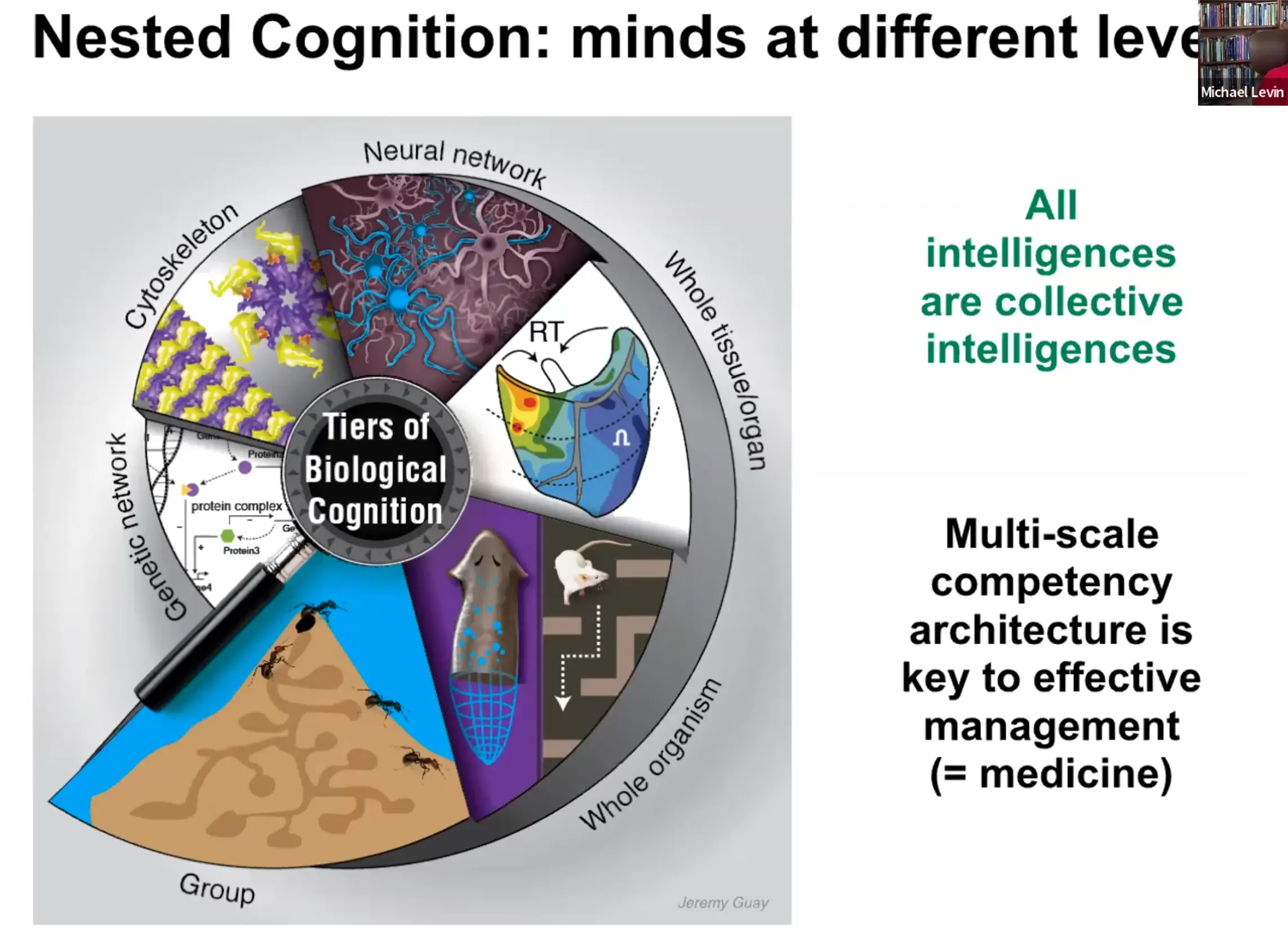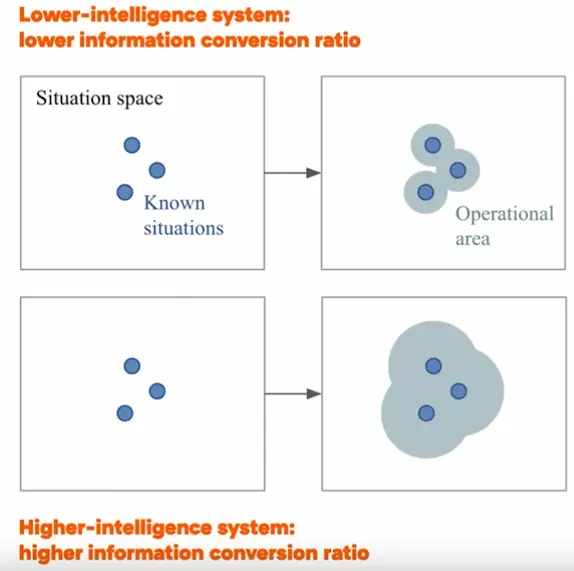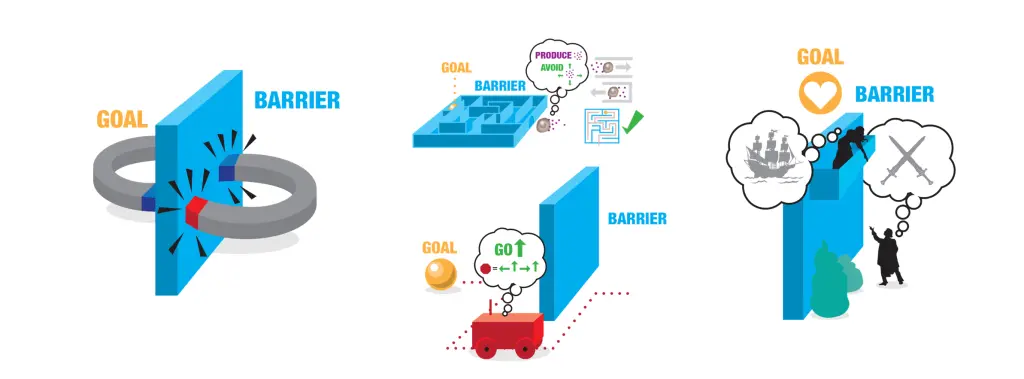Link to original

Must-reads:
- https://whatisintelligence.antikythera.org/ / YT: Blaise Agüera y Arcas | What is Intelligence?
- On the Measure of Intelligence
- The Pretense of Knowledge - On the insidious presumptions of Artificial Intelligence
^4a5e2dLink to originalIntelligence is skill-acquisition efficiency.
The size of the skill-space you can navigate within a given time / budget is the generality of the intelligence.
Joscha Bach calls this the ability to make models, which is the same thing. Being good at a single task is a skill. Having a model that allows you to pick up different skills is intelligence.
Intelligence is defined by the horizon in which you can set and achieve goal (cognitive light cone). - Levin
In humans that light cone can stretch further than their lifetime / what is achievable in their lifetime.
Inteligent things have problem solving competencies.
Some degree of the ability to get to the same goal with different means. - William James / michael levin
This is a practical / interesting definition, because it presupposes that there is some problem space the agent is working on, but it doesn’t say you have to be artificial / natural / …
→ You have some amount of skill navigating a problem space despite interventions / surprises.
This focus on problem solving doesn’t really handle play or emotions.
“Intelligence measures an agent’s ability to achieve goals in a wide range of environments.” - Legg&Hutter
Intelligence is the ability to produce high-abstraction models using as little data as possible. It enables you to acquire high levels of skill at arbitrary tasks from very little experience with the task. -Chollet,X
Crucially, intelligence is not skill. A system can be skilled at arbitrarily many tasks and yet possess low or even zero intelligence. All how need is to compensate for lack of intelligence by increasing your amount of information / experience wrt the task(s).
Intelligence the ability to, and efficiency of solving unseen tasks.
Link to originalBach’s definition of intelligence
Intelligence is the ability to make models.
This definition also accounts for the fact that many very intelligent people are not good at getting things done.
Intelligence and Goal-Rationality are orthogonal to eachother.
→ Excessive intelligence is often a prothesis for bad regulation.
I hypothesize that intelligence (agential behavior implementing problem-solving) is present at the lowest levels in our Universe, not requiring brains or even life per se. - levin
Link to originalAll intelligences are collective intelligences, they are made up of parts that are themselves biological agents.
Link to originalPrevious notions of intelligence
The evolutionary psychology view of human nature is that much of the human cognitive function is the result of special-purpose adaptations that arose to solve specific problems encountered by humans throughout their evolution – an idea which originated with Darwin and that coalesced in the 1960s and 1970s. Around the same time that these ideas were gaining prominence in cognitive psychology, early AI researchers, perhaps seeing in electronic computers an analogue of the mind, mainly gravitated towards a view of intelligence as a set of static program-like routines, heavily relying on logical operators, and storing learned knowledge in a database-like memory. This vision of the mind as a wide collection of vertical, relatively static programs that collectively implement “intelligence”, was most prominently endorsed by influential AI pioneer Marvin Minsky (see e.g. The Society of Mind, 1986). This view gave rise to definitions of intelligence and evaluation protocols for intelligence that are focused on task-specific performance.
There is no distribution for the world. If there was, intelligence wouldn’t be necessary.
Some insects for example do not have intelligence, but have hard-coded behavioural programs that match some stimuli to an appropriate response. They can navigate their life like that without ever having to learn anything.
If the world was static / predictable enough, evolution would have hard-coded the optimal program into our brains, but in this world, intelligence is necessary. In fact, life depends on the intelligence on the lowest level, see: agential material.
Intelligence is what you use, when you don’t know what to do. - Jean Piaget
… i.e. when you encounter novel situations, when you face something unexpected, something you haven’t been prepared for by your experience or by evolution!
The ability to do some degree of delayed gratification is one component of intelligence.
While humans, many animals, and autonomous vehicles can get around obstacles to get to their goal, magnets for example will not – they are simply trying to minimize energy and thus can’t even temporarily go against the gradient, pull further apart, to then go around the barrier to meet each other and get even closer together.
Transclude of principles#^4b43f5
What does he mean by this?
it is not really a thing, but more of a relationship
Link to original
Intelligence = prediction = compression = program search = SGD
Intelligence is the likelihood of an agent achieving its goal (quote)
Will super-intelligences be so advanced, that we cannot communicate / understand them anymore?
Very few people understand general relativity, quantum mechanics, etc.
Yet, Einstein for example was still able to communicate with the rest of us, explain concepts, etc.
So this is already happening.

